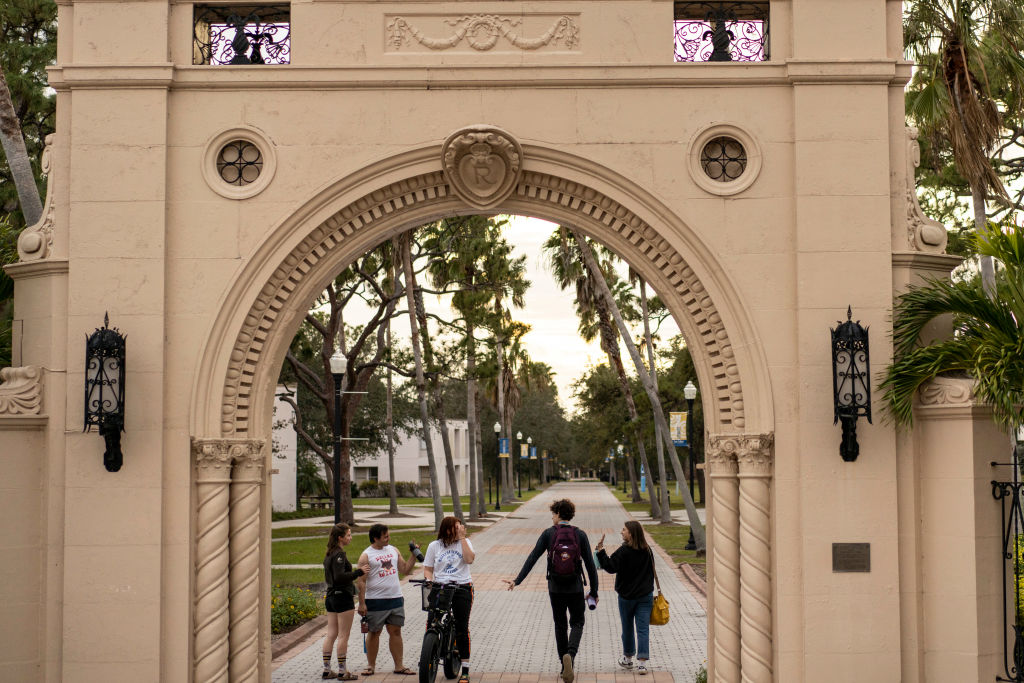Conservatives have long held conflicting impulses about intellectual freedom at American universities. On the one hand, they have often called for greater protections for free expression and intellectual diversity. Conservative victims of “cancel culture” can become media darlings on the right, and conservatives have been important to winning more robust protections for campus free speech. On the other hand, some conservatives hold reservations about the virtues of academic freedom and have demanded that universities cater to the particular sensitivities of conservative students.
Florida Gov. Ron DeSantis, who has attached himself to the issue of higher education more than any politician in the country, refuses to choose between these two options. Instead he attempts to grasp them both. He has insisted that a university “should be a place where you would be exposed to a lot of different ideas” while his allies characterize the state’s universities as “socialism factories.” He says that “we want robust First Amendment speech on our college and university campuses,” but in response to what he calls “intellectually repressive environments,” he has tried to implement policies that have themselves run up against the First Amendment. It is unclear whether this is a viable political strategy in the long run, but in the meantime institutions of higher education in Florida find themselves in a difficult spot.
DeSantis has adopted a machine gun approach to conservative complaints about higher education, spraying bullets everywhere in the hopes that some might hit the target, without worrying too much about collateral damage. Given the rush of activity, mixed motives, and heated rhetoric, it is also not surprising that his critics have not always been too careful about distinguishing between genuine threats to academic freedom and mere policy disagreements. Nonetheless, the risk to free inquiry at Florida state universities under DeSantis is a real one.
The governor maintained a studied silence as the University of Florida stumbled through a high-profile academic freedom controversy in the fall of 2021. The university adopted a new conflict of interest policy for its faculty, then used it to block professors from serving as expert witnesses in lawsuits filed against the state. It was an extraordinary move that ran headlong not only into academic freedom principles but also established First Amendment case law. The university president eventually backtracked on the policy (and the university is now under a preliminary injunction barring enforcement of the policy).
The expert witness case might be chalked up to the missteps of university administrators (and one would expect better from the newly installed university president, former Sen. Ben Sasse), but that seems overly optimistic. It is no accident that the case at issue in the initial scandal involved a legal challenge to the voting rights law that DeSantis had championed. Subsequent investigations revealed that far more was going on behind the scenes: The university administration was systematically trying to quash any faculty activity on campus, including scholarly activity, that might anger the governor. Fear of political reprisals against the university was having exactly the kind of chilling effect that First Amendment scholars worry about.
University administrators do not seem to have been worrying over nothing. Republican appointees to university boards of trustees have been explicit that they think the political opinions of members of the faculty should be relevant to hiring and promotion decisions. After an accreditation agency expressed concern over the University of Florida’s conflict of interest policy, lawmakers in Tallahassee moved to change accreditation agencies. At the same time, the state university system board of governors launched a new post-tenure review system that is worrisomely inadequate in protecting faculty from political pressure.
Then in the spring of 2022, Florida adopted the so-called “Stop WOKE Act” that interfered directly with classroom teaching. Modeled on similar policies that had targeted K-12 education and workplace training, the statute made Florida a leader in extending such policies to higher education. Like its predecessors, the legislation suffered from vagueness and overbreadth that would hamper educationally appropriate instruction. As applied to higher education, the law represents a near unprecedented legislative intrusion into what ideas and viewpoints can be discussed in college classrooms. In issuing a preliminary injunction that has blocked implementation of the law, a federal judge described the measure as “positively dystopian,” adding that DeSantis effectively has claimed that “the State has unfettered authority to muzzle its professors in the name of ‘freedom.’”
Despite the injunction, it is clear that the governor’s office wants state university officials—and faculty—to know that politicians are looking over their shoulders. Most troubling, but perhaps least reported, was the request from the governor’s office to university leaders demanding to know what courses were being taught that “contain [Diversity, Equity and Inclusion] and/or [Critical Race Theory] components”—and the names and ranks of the instructors teaching them.
Traditional academic freedom principles (and likely First Amendment protections in state universities) secure the right of professors to include “DEI and/or CRT components” in relevant classes, regardless of how controversial such ideas might be among the state citizenry or politicians. Requesting the names of offending professors in the current political environment is inimical to the independence of mind that American universities, including public universities, should be fostering. Feeling the political heat, state universities in Florida have begun scrubbing their curriculum clean of anything that might get negative attention from Tallahassee.
Some recent more visible moves by officials in Florida are concerning and will require careful scrutiny, but only time will tell whether they overstep the limits of political oversight of state universities. As the governor’s office was quietly seeking information about the content of college classes, it was more publicly demanding information about the university expenditures on “all staff, programs, and campus activities related to diversity, equity and inclusion and critical race theory.” The request was framed as part of the governor’s budget planning process. It appears the government learned that there is a lot of such activity on state university campuses, which costs a fair amount of money in absolute dollars but which adds up to a pittance relative to the size of university budgets.
The administrative infrastructure of American universities has grown at a brisk pace in recent decades, and there is now a vast amount of student-facing programming on college campuses that is designed and operated entirely by administrators. Administrators do not, and should not, enjoy academic freedom. The size and scope of their activities on campus are of legitimate interest to both university leaders and to state policymakers. It would be highly unusual, and ultimately not a very good model for university governance, for legislators—or even trustees—to attempt to micromanage offices of campus life and student affairs at state universities, but the non-curricular activities of universities are not immune from political oversight.
Unfortunately, the politicians in Florida have not made a sharp distinction between scholarly and other activity at state universities—and it is hard to escape the conclusion that they have done so intentionally. University officials have gotten the message that the politicians do not like anything that can be broadly cast as “woke.” They act accordingly. The presidents of the more than two dozen schools in the Florida College System issued a remarkable collective statement proclaiming that they would scrub their campuses of “all initiatives, instruction, and activities” that promote disfavored ideologies. Although nodding toward academic freedom commitments, the announcement cannot be squared with any serious commitment to free intellectual inquiry at a collegiate level. In practice, faculty at state institutions are instructed to steer clear of any politically controversial content.
DeSantis has most recently announced a slate of new trustees for the state’s public liberal arts college, New College. Trustees at state universities are invariably politically connected and reflect the interests and concerns of the state governors. This reality has not infrequently resulted in clashes between board members and university officials, including in some cases over individual personnel decisions and academic affairs. With his New College announcement, however, DeSantis has taken a very unusual path. These trustees come with a gubernatorial mandate to remake the institution into something more appealing to conservatives, a “Hillsdale of the South.” Moreover, his appointments are far more strategic than usual, coming with the intellectual credentials and academic experience to understand how New College works. As Cathy Young has detailed, the slate, including most prominently the Manhattan Institute’s Christopher Rufo, has shown reliable hostility to recent trends in academia but no similar commitment to traditional academic freedom concerns. DeSantis certainly could have selected a more diverse set of trustees that would share his concern about academia but who also valued the intellectual freedom of university faculty. As it stands, this has much more of a feel of a hostile political takeover of an academic institution.
It remains to be seen how the new trustees will approach their task. There is much that they can do that would shake up New College without violating academic freedom commitments. But in their haste to transform the school, it is not hard to imagine them seeking to override the existing faculty on basic academic questions that should properly be insulated from such political interventions. Unfortunately, the public discussion of any actions taken at New College will undoubtedly lack the necessary nuance to distinguish between debatable policy choices and a more distressing politicization of university instruction.
As DeSantis continues to position himself for a likely presidential run, there will undoubtedly be more initiatives aimed at higher education in Florida. The record so far is not necessarily encouraging. Rather than freeing the state universities from stifling political orthodoxies, Republicans in Florida all too often seem more interested in installing orthodoxies of their own. While giving lip service to the recent conservative impulse to enhance freedom of expression, the political leadership in Florida seems in practice to be giving free rein to the conservative impulse to root out ideas that they find offensive. Meet the new boss. Same as the old boss.







Please note that we at The Dispatch hold ourselves, our work, and our commenters to a higher standard than other places on the internet. We welcome comments that foster genuine debate or discussion—including comments critical of us or our work—but responses that include ad hominem attacks on fellow Dispatch members or are intended to stoke fear and anger may be moderated.
With your membership, you only have the ability to comment on The Morning Dispatch articles. Consider upgrading to join the conversation everywhere.